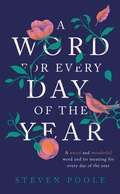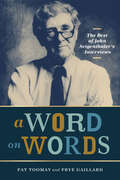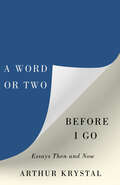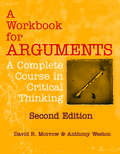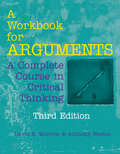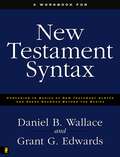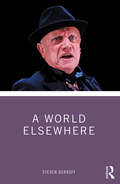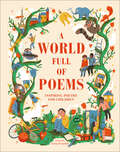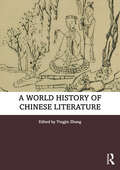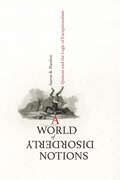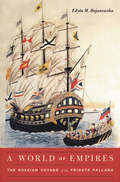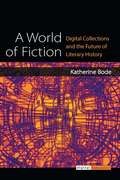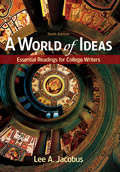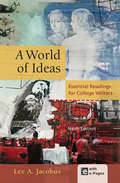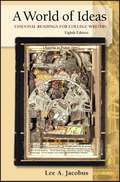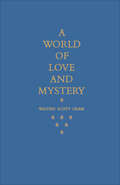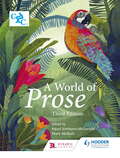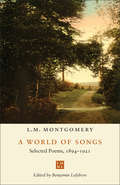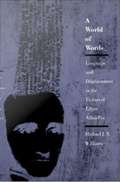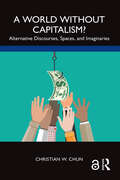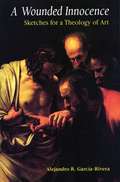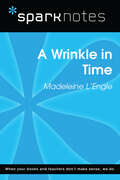- Table View
- List View
A Word for Every Day of the Year
by Steven PooleA weird and wonderful word and its meaning for every day of the year.'A lexicological delight' Professor David CrystalWho knew that to dringle is to 'waste time in a lazy lingering manner'? Or that a sudden happy ending could be termed a eucotastrophe? Looking for an alternative word to 'bullshit'? Then try taradiddle.A Word for Every Day of the Year is a fascinating collection of 366 words and their definitions, perfect for anyone who loves the richness of the English language, its diversity and wants to expand their vocabulary. Each day offers a rare and remarkable word with its history and definition and occasionally a challenge to include it in our lives.
A Word on Words: The Best of John Seigenthaler's Interviews
by Pat Conroy Alice Randall Kinky Friedman David Halberstam Doris Kearns Goodwin David Maraniss Jon Meacham Marshall Chapman John Lewis Ann Patchett William Marshall John Egerton Nikki Giovanni Arna Bontemps William Price Fox Waylon Jennings Rodney Crowell Marty Stuart Dori Sanders Charles Fountain Jesse Hill Ford John Michael SeigenthalerFor years the legendary John Seigenthaler hosted A Word on Words on Nashville's public television station, WNPT. During the show&’s four-decade run (1972 to 2013), he interviewed some of the most interesting and most important writers of our time. These in-depth exchanges revealed much about the writers who appeared on his show and gave a glimpse into their creative processes. Seigenthaler was a deeply engaged reader and a generous interviewer, a true craftsman. Frye Gaillard and Pat Toomay have collected and transcribed some of the iconic interactions from the show. Featuring interviews with: Arna Bontemps • Marshall Chapman • Pat Conroy • Rodney Crowell • John Egerton • Jesse Hill Ford • Charles Fountain • William Price Fox • Kinky Friedman • Frye Gaillard • Nikki Giovanni • Doris Kearns Goodwin • David Halberstam • Waylon Jennings • John Lewis • David Maraniss • William Marshall • Jon Meacham • Ann Patchett • Alice Randall • Dori Sanders • John Seigenthaler Sr. • Marty Stuart • Pat Toomay
A Word or Two Before I Go: Essays Then and Now
by Arthur KrystalPraise for Arthur Krystal:"Arthur Krystal’s essays shine like a searchlight through the fog of contemporary culture. Vivid, sharp, and enlightening, they keep a steady keel through roiling waters."—Edward Mendelson, Lionel Trilling Professor of the Humanities, Columbia University"Krystal celebrates the author compelled to write by a sense of mortality and the critic qualified to judge literature by traits of temperament and taste.... And as his vibrant, well-considered essays reveal, Krystal has not entirely relinquished hope that ‘books, despite the critics’ polemics, are still the truest expressions of the human condition.’"—Elizabeth Mary Sheehan, New York Times Book Review"Arthur Krystal’s mind and style manage to flourish in a postmodern culture where literature has—in his fine phrasing—‘become the center that is somehow beside the point.’"—Thomas MallonAlthough Arthur Krystal shies away from the title of essayist, his essays have appeared in the New Yorker, Harper’s, the American Scholar, the New York Times Book Review, and other publications. Moreover, such dissimilar critics as Dana Gioia, Morris Dickstein, Edward Mendelson, Christopher Hitchens, and Joseph Epstein have all lauded his work. And his first book, Agitations: Essays on Life and Literature, was a finalist for the 2003 PEN Award for the Art of the Essay.Accolades aside, Krystal simply regards himself as someone who writes sentences to see where they take him. In A Word or Two Before I Go, Krystal offers us—if he is to be believed—his final collection. These eleven essays and one evocative story range in subject matter from the depredations of aging and the anomalies of cultural appropriation to the friendship between Jacques Barzun and Lionel Trilling and the day Muhammad Ali punched Krystal in the face.
A Workbook for Arguments, Second Edition: A Complete Course in Critical Thinking
by Anthony Weston David R. MorrowA Workbook for Arguments builds on Anthony Weston’s A Rulebook for Arguments to provide a complete textbook for a course in critical thinking or informal logic. The second edition adds:Updated and improved homework exercises—nearly one third are new—to ensure that the examples continue to resonate with students.Increased coverage of scientific reasoning, demonstrating how scientific reasoning dovetails with critical thinking more generallyTwo new activities in which students analyze arguments in their original form, as provided in brief selections from the original texts.This edition continues to includeThe entire text of Rulebook, supplemented with extensive explanations and exercises.Homework exercises adapted from a wide range of arguments in a wide variety of sources.Practical advice to help students succeed.Model answers to odd-numbered problems, including commentaries on the strengths and weaknesses of selected sample answers and further discussion of some of the substantive intellectual, philosophical, or ethical issues they raise.Detailed instructions for in-class activities and take-home assignments.An appendix on mapping arguments, giving students a solid introduction to this vital skill in constructing complex and multi-step arguments and evaluating them.
A Workbook for Arguments: A Complete Course in Critical Thinking
by Anthony Weston David R. MorrowDavid Morrow and Anthony Weston build on Weston's acclaimed A Rulebook for Arguments to offer a complete textbook for a course in critical thinking or informal logic. Features of the book include: Homework exercises adapted from a wide range of actual arguments from newspapers, philosophical texts, literature, movies, YouTube videos, and other sources.Practical advice to help students succeed when applying the Rulebook's rules.Suggestions for further practice that outline activities students can do by themselves or with classmates to improve their critical thinking skills.Detailed instructions for in-class activities and take-home assignments designed to engage students in critical thinking.An appendix on mapping arguments, a topic not included in the Rulebook, that introduces students to this vital skill in evaluating or constructing complex and multi-step arguments.Model responses to odd-numbered exercises, including commentaries on the strengths and weaknesses of selected model responses as well as further discussion of some of the substantive intellectual, philosophical, and ethical issues raised by the exercises. The third edition of Workbook contains the entire text of the recent fifth edition of the Rulebook, supplementing this core text with extensive further explanations and exercises.Updated and improved homework exercises ensure that the examples continue to resonate with today&’s students. Roughly one-third of the exercises have been replaced with updated or improved examples.A new chapter on engaging constructively in public debates—including five new sets of exercises—trains students to engage respectfully and constructively on controversial topics, an increasingly important skill in our hyper-partisan age. Three new critical thinking activities offer further opportunities to practice constructive dialogue.
A Workbook for New Testament Syntax: Companion to Basics of New Testament Syntax and Greek Grammar Beyond the Basics
by Daniel B. Wallace Grant EdwardsDaniel B. Wallace’s groundbreaking books Greek Grammar Beyond the Basics: An Exegetical Syntax of the New Testament and Basics of New Testament Syntax have become the standard textbooks among colleges and seminaries for teaching New Testament Greek syntax. This workbook, designed to accompany both books, presents a dynamic approach to learning Greek syntax. Instead of simply learning syntax in single-verse snippets, students are exposed to all of the major syntactical categories in exegetically and theologically significant passages.
A World Elsewhere
by Steven BerkoffA World Elsewhere is Steven Berkoff’s bold attempt to describe his multifarious theatrical works. Berkoff outlines the methods that he uses, first of all as an actor, secondly as a playwright and thirdly as theatre director, as well as those subtle connections in between, when one discipline melds effortlessly into another. He examines the early impulses that generated his works and what drove him to give them form, as well as the challenges he faced when adapting the work of other authors. Berkoff discusses some of his most difficult, successful and unique creations, journeying through his long and varied career to examine how they were shaped by him, and how he was shaped by them. The sheer scale of this book offers a rare experience of an accomplished artist, combined with the honesty and insight of an autobiography, making this text a singular tool for teaching, inspiration and personal exploration. Suitable for anyone with an interest in Steven Berkoff and his illustrious career, A World Elsewhere is the part analysis and part confession of an artist whose work has been performed all over the world.
A World Full of Poems
by DKA gorgeously illustrated introduction to poetry for children, featuring poems about everything from science, sports, and space, to friendship, family, and feelings.This thoughtfully crafted anthology is perfect for children new to verse and for young poetry fans seeking out new favorites. Explore poetry from a diverse selection of contemporary and historical poets, covering a broad range of topics—from personal subjects like emotions and family, to the wonders of the natural environment. Carefully selected works encourage children to see the poetry in everything and to embrace the beauty of their everyday lives.Prompts and activities inspire children to create their own poetry, and devices like rhyme, repetition, and alliteration are introduced and explained in a fun and accessible manner.
A World History of Chinese Literature
by Yingjin ZhangProviding a broad introduction to the area, A World History of Chinese Literature maps the field of Chinese literature across its various worlds, looking both within – at the world of Chinese literature, its history, linguistic, cultural, local, and regional specificities – and without – at the way Chinese literature has circulated throughout the world. The thematic focus allows for a broad number of key categories, such as authors, genres, genders, regions, as well as innovative explorations of new topics and issues such as inter-arts performativity and transmediation. The sections cover the circulation and reception of China in world literature, as well as the worlds of: Chinese literature across the globe Borders, oceans, and rainforests Comparative literary genres Translingual writers and scholars Gender configurations Translation and transmediation With a focus on the twentieth and twenty-first century, this collection intervenes in current debates on global Chinese literature, Sinophone and Sinoscript studies, and the production and reception of literary works by ethnic Chinese in non-Sinitic languages, as well as Anglophone literature inspired by Chinese literary tradition. It will be of interest to anyone working on or studying Chinese literature, language and culture, as well as world literatures in relation to China.
A World Not to Come
by Raul CoronadoA shift of global proportions occurred in May 1808. Napoleon Bonaparte invaded Spain and deposed the Spanish king. Overnight, the Hispanic world was transformed forever. Hispanics were forced to confront modernity, and to look beyond monarchy and religion for new sources of authority. A World Not to Come focuses on how Spanish Americans in Texas used writing as a means to establish new sources of authority, and how a Latino literary and intellectual life was born in the New World. The geographic locale that became Texas changed sovereignty four times, from Spanish colony to Mexican republic to Texan republic and finally to a U. S. state. Following the trail of manifestos, correspondence, histories, petitions, and periodicals, Raúl Coronado goes to the writings of Texas Mexicans to explore how they began the slow process of viewing the world as no longer being a received order but a produced order. Through reconfigured publics, they debated how best to remake the social fabric even as they were caught up in a whirlwind of wars, social upheaval, and political transformations. Yet, while imagining a new world, Texas Mexicans were undergoing a transformation from an elite community of "civilizing" conquerors to an embattled, pauperized, racialized group whose voices were annihilated by war. In the end, theirs was a world not to come. Coronado sees in this process of racialization the birth of an emergent Latino culture and literature.
A World of Books: Assessment Pack (Great Minds Wit & Wisdom #Grade 1, Module 1)
by Ann Brigham Lauren Chapalee Lorraine GriffithNIMAC-sourced textbook
A World of Disorderly Notions: Quixote and the Logic of Exceptionalism
by Aaron R. HanlonShortlisted for the Kenshur Prize for Best Book in Eighteenth-Century Studies from the Indiana University Center for Eighteenth-Century StudiesFrom Jonathan Swift to Washington Irving, those looking to propose and justify exceptions to social and political norms turned to Cervantes’s notoriously mad comic hero as a model. A World of Disorderly Notions examines the literary and political effects of Don Quixote, arguing that what makes this iconic character so influential across oceans and cultures is not his madness but his logic. Aaron Hanlon contends that the logic of quixotism is in fact exceptionalism—the strategy of rendering oneself an exception to everyone else’s rules.As British and American societies of the Enlightenment developed the need to question the acceptance of various forms of imperialism and social contract theory—and to explain both the virtues and limitations of revolutions past and ongoing—it was Quixote’s exceptionalism, not his madness, that captured the imaginations of so many writers and statesmen. As a consequence, the eighteenth century witnessed an explosion of imitations of Quixote in fiction and polemical writing, by writers such as Jonathan Swift, Charlotte Lennox, Henry Fielding, and Washington Irving, among others.Combining literary history and political theory, Hanlon clarifies an ongoing and immediately relevant history of exceptionalism, of how states from Golden Age Spain to imperial Britain to the formative United States rendered themselves exceptions so they could act with impunity. In so doing, he tells the story of how Quixote became exceptional.
A World of Empires: The Russian Voyage of the Frigate <i>Pallada</i>
by Edyta M. BojanowskaMany people are familiar with American Commodore Matthew Perry’s expedition to open trade relations with Japan in the early 1850s. Less well known is that on the heels of the Perry squadron followed a Russian expedition secretly on the same mission. Serving as secretary to the naval commander was novelist Ivan Goncharov, who turned his impressions into a book, The Frigate Pallada, which became a bestseller in imperial Russia. In A World of Empires, Edyta Bojanowska uses Goncharov’s fascinating travelogue as a window onto global imperial history in the mid-nineteenth century. Reflecting on encounters in southern Africa’s Cape Colony, Dutch Java, Spanish Manila, Japan, and the British ports of Singapore, Hong Kong, and Shanghai, Goncharov offers keen observations on imperial expansion, cooperation, and competition. Britain’s global ascendancy leaves him in equal measures awed and resentful. In Southeast Asia, he recognizes an increasingly interlocking world in the vibrant trading hubs whose networks encircle the globe. Traveling overland back home, Goncharov presents Russia’s colonizing rule in Siberia as a positive imperial model, contrasted with Western ones. Slow to be integrated into the standard narrative on European imperialism, Russia emerges here as an increasingly assertive empire, eager to position itself on the world stage among its American and European rivals and fully conversant with the ideologies of civilizing mission and race. Goncharov’s gripping narrative offers a unique eyewitness account of empire in action, in which Bojanowska finds both a zeal to emulate European powers and a determination to define Russia against them.
A World of Fiction: Digital Collections and the Future of Literary History (Digital Humanities)
by Katherine BodeDuring the 19th century, throughout the Anglophone world, most fiction was first published in periodicals. In Australia, newspapers were not only the main source of periodical fiction, but the main source of fiction in general. Because of their importance as fiction publishers, and because they provided Australian readers with access to stories from around the world—from Britain, America and Australia, as well as Austria, Canada, France, Germany, New Zealand, Russia, South Africa, and beyond—Australian newspapers represent an important record of the transnational circulation and reception of fiction in this period. Investigating almost 10,000 works of fiction in the world’s largest collection of mass-digitized historical newspapers (the National Library of Australia’s Trove database), A World of Fiction reconceptualizes how fiction traveled globally, and was received and understood locally, in the 19th century. Katherine Bode’s innovative approach to the new digital collections that are transforming research in the humanities are a model of how digital tools can transform how we understand digital collections and interpret literatures in the past.
A World of Ideas
by Lee A. JacobusThe first and bestselling reader of its kind, A World of Ideas introduces students to great thinkers whose ideas have shaped civilizations throughout history. When students hear names like Aristotle, Martin Luther King, Jr. , Virginia Woolf, or Sigmund Freud, they recognize the author as important -- and they rise to the challenge of engaging with the text and evaluating it critically. No other composition reader offers a comparable collection of essential readings along with the supportive apparatus students need to understand, analyze, and respond to them.
A World of Ideas
by Lee A. JacobusThe first and bestselling reader of its kind, A World of Ideas introduces students to great thinkers whose ideas have shaped civilizations throughout history. When students hear names like Aristotle, Martin Luther King, Jr. , Virginia Woolf, or Sigmund Freud, they recognize the author as important -- and they rise to the challenge of engaging with the text and evaluating it critically. No other composition reader offers a comparable collection of essential readings along with the supportive apparatus students need to understand, analyze, and respond to them.
A World of Ideas: Essential Readings for College Writers
by Lee A. JacobusThe most successful reader of its kind,A World of Ideas introduces first-year writing students to the thinkers and writers whose ideas have shaped civilization: for example, Niccolò Machiavelli on government, Elizabeth Cady Stanton on justice, and Sigmund Freud on the mind. Because students perceive these writers as important, they take the writing course seriously: they learn to read more attentively, think more critically, and write more effectively. No other composition reader offers a comparable collection of important readings along with the supportive apparatus students need to understand, analyze, and respond to them.
A World of Love and Mystery
by Walden Scott CramA World of Love and Mystery is a collection of poetry divided into three parts written by the poet Walden Scott Cram.
A World of Prose: Third Edition
by Hazel Simmons-McDonald Mark McWattInspire students to enjoy literature while helping them to prepare effectively for the CSEC® examination; ensure coverage of all prescribed poems for the revised CSEC® English A and English B syllabuses with an anthology that has been compiled with the approval of the Caribbean Examinations Council by Editors who have served as CSEC® English panel members.- Stimulate an interest in and enjoyment of literature with a wide range of themes and subjects, a balance of well-known texts from the past and more recent works, as well as stories from the Caribbean and the rest of the world.- Support understanding with notes on each text and questions to provoke discussion, and a useful checklist to help with literary analysis.- Consolidate learning with practical guidance on how to tackle examination questions including examples of model answers for reference.
A World of Songs: Selected Poems, 1894–1921 (The L.M. Montgomery Library)
by L. M. Montgomery Benjamin LefebvreCelebrated as a novelist and made famous by her novel Anne of Green Gables and its sequels, L.M. Montgomery (1874–1942) is far less known for also writing and publishing hundreds of poems over a period of half a century.Although this output included a chapbook and a full-length collection in which she presented herself primarily as a nature poet, most of her poems appeared in periodicals, including women’s magazines, farm papers, faith-based periodicals, daily and weekly newspapers, and magazines for children. As a shrewd businesswoman, she learned to find the balance between literary quality and commercial saleability and continued to publish poetry even though it paid less than short fiction. A World of Songs: Selected Poems, 1894–1921, the second volume in The L.M. Montgomery Library, gathers a selection of fifty poems originally published across a twenty-five-year period. Benjamin Lefebvre organizes this work within the context of Montgomery’s life and career, claiming her not only as a nature poet but also as the author of a wider range of "songs": of place, of memory, of lamentation, of war, of land and sea, of death, and of love. Many of these poems echo motifs that readers of Montgomery’s novels will recognize, and many more explore surprising perspectives through the use of male speakers. These poems offer today’s readers a new facet of the career of Canada’s most enduringly popular author.
A World of Words: Language and Displacement in the Fiction of Edgar Allan Poe
by Michael J. S. WilliamsA World of Words offers a new look at the degree to which language itself is a topic of Poe's texts. Stressing the ways his fiction reflects on the nature of its own signifying practices, Williams sheds new light on such issues as Poe's characterization of the relationship between author and reader as a struggle for authority, on his awareness of the displacement of an "authorial writing self" by a "self as it is written," and on his debunking of the redemptive properties of the romantic symbol.
A World without Capitalism?: Alternative Discourses, Spaces, and Imaginaries
by Christian W. ChunIn this book, Christian W. Chun examines the ways in which identities, discourses, and topographies of both capitalist and anti-capitalist imaginaries and realities are embodied in the everyday practices of people. A World without Capitalism? is a sociolinguistic ethnography that explores the heretofore limited research in applied linguistics and sociolinguistics on the discursive and materialized representations and enactments of capitalism. Engaging across disciplinary fields, including applied linguistics, ethnography, political economy, philosophy, and cultural studies, Chun investigates in ethnographic detail how capitalism does and does not pervade people’s everyday experiences. This book aims to further contribute to a much-needed understanding of how discourses operate in the co-constructions of capitalist and anti-capitalist imaginaries and instantiated realities and practices as narrated, lived, and embodied by people and material artifacts. This book is vital reading for students and researchers working in the fields of applied linguistics, discourse analysis, and cultural studies, as well as those interested in understanding capitalism and questioning how to live beyond it.
A Wounded Innocence: Sketches For A Theology Of Art
by Alejandro R. Garcia-RiveraWhat is the theological significance of art? Why has the Church always encouraged the arts? What is so profoundly human about the arts? In A Wounded InnocenceAlejandro R. Garcia-Rivera answers these questions in a series of sketches" that are mixed spiritual and theological reflections on various works of art written in a poetic style. These reflections explore the relationship between the multi-dimensional spiritual and the arts. <P><P> The first *sketch, - *The Beginning of Art, - introduces the rest that go on to explore further the human, artistic, and theological implications of a wounded innocence. Each *sketch - reflects on a particular human work of art. Some are conventional works of art. Others may never find their way into a museum but, then, that is one of the implications coming out of this book. A museum does not define what a work of art is, its human depth does. In these deeply studied yet spiritually written reflections on each work of art, it is hoped that the reader will find his and her own creative depth described, perhaps even revealed. <P><P> A Wounded Innocenceis both inspiring and informative. Readers will learn about art, spirituality, and theology, and will find themselves inspired to look at works of art, and even to produce a work of art. It sets a new way of doing theology that is at the same time spiritual. More importantly, Garcia-Rivera describes a theology of art. <P><P> Chapters are *The Beginning of Art, - *The End of Art, - *Human Freedom and Artistic Creativity, - *Heaven-with-Us, - *The Human Aspect of Atonement, - *The Tyger and the Lamb, - and *A Wounded Innocence. - Includes black and white art. <P><P> Alejandro R. Garcia-Rivera, PhD, is associate professor of systematic theology at the Jesuit School of Theology at Berkeley. The author of numerous articles, he also wrote a Catholic Press Association award-winning book on theology and aesthetics titled The Community of the Beautiful(The Liturgical Press).
A Wrinkle in Time (SparkNotes Literature Guide Series)
by SparkNotesA Wrinkle in Time (SparkNotes Literature Guide) by Madeleine L'Engle Making the reading experience fun! Created by Harvard students for students everywhere, SparkNotes is a new breed of study guide: smarter, better, faster. Geared to what today's students need to know, SparkNotes provides: *Chapter-by-chapter analysis *Explanations of key themes, motifs, and symbols *A review quiz and essay topicsLively and accessible, these guides are perfect for late-night studying and writing papers
